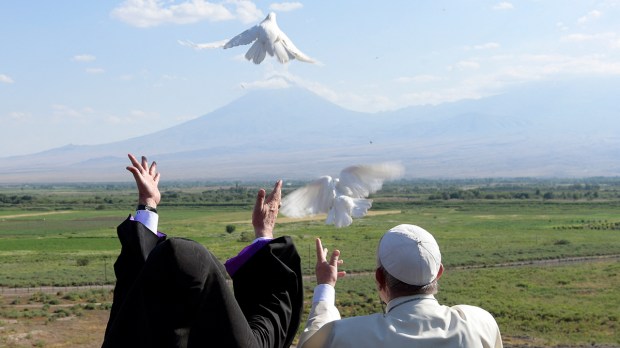The Maronite Archbishop Chucrallah-Nabil El-Hage was involved in the prayer initiative “Day of Prayer for Peace for the Middle East,” which will bring together all of the Middle East beginning on Sunday. In an interview with the pontifical foundation Aid to the Church in Need (ACN), the Archbishop Emeritus of Tyros (Lebanon) spoke of his conviction that prayer can give the gift of peace.
Your Excellency, on this coming Sunday, the Catholics in the Middle East will make peace in the region the focus of their prayers. This will be followed by months of special initiatives. The idea for this arose in Lebanon. What inspired this?
The idea was developed by the commission “Justitia et Pax” in Lebanon, of which I am the chairman. We then presented it to the Catholic patriarchs in the region and they took up the idea. Several factors were brought to bear. The first is that the month of June is dedicated to the Sacred Heart of Jesus. The patriarchs believe that peace not only arises through or from Jesus, but flows directly out of His heart. For this reason, the opening Mass will be held on the last Sunday of the month of the Sacred Heart of Jesus. Then, Pope Francis has proclaimed a Year of St. Joseph. This is why we have placed the Holy Family, of which St. Joseph was the protector, at the focus of the initiative. We are dedicating all of the Middle East to the Holy Family. An icon of the Holy Family that contains relics of the Basilica of the Annunciation in Nazareth has been specially written for this initiative and will begin its journey through the Middle East.
This is the first time that the focus is completely on the Holy Family, isn’t it?
Yes, that is true. As I said, the Year of St. Joseph, which the pope proclaimed for the Universal Church, played a decisive role in this. After all, the Holy Family represents what so many of today’s families are experiencing across the region. These families have likewise been forced to flee and are experiencing hardship and rejection – just as the Holy Family once did. However, a blessing for the entire world arose out of the hardships experienced by the Redeemer. This is our hope for today’s world and for our region. A third factor also came into play: this year marks the 130th anniversary of the publication of the encyclical Rerum novarum by Pope Leo XIII. This is the foundational document of Catholic social teaching. The Middle East has great need of this teaching. It is a perpetual appeal for justice and peace. It would be truly inspiring for those governing the region.
Why do the patriarchs believe that prayers for peace are particularly important now? Is it because of the most recent war in the Holy Land?
You see, the Middle East knows no peace. Wars define our region. Take Yemen for example. There are hardly any Christians there. However, as believers, we cannot just shrug off the conflict that has been raging there for many years. The Holy Land, on the other hand, is currently being shaken by another round of violence. The conflict in Syria has not been resolved. Nor that in Libya. Lebanon is suffering a severe economic crisis. Our country is marked by inflation, unemployment and hardship. We are truly in need of prayers for peace.
What do you say to sceptics who do not or no longer believe in the power of prayer?
Of course, there are those voices as well. But they are misguided. There can be no justice and no peace without changing the hearts of the people. And what other than God’s mercy can change the heart of the people? No, we have to pray. Moreover, people who pray with sincerity cannot feel hate. This is again a contribution towards peace.
Do you believe that the attention of the Universal Church for the Middle East has waned with the end of ISIS?
Unfortunately, yes. Of course we realise that everyone is busy with themselves because of the COVID pandemic. However, we all need solidarity. Therefore, I am thankful for organisations such as ACN, which demonstrate true solidarity with Churches in need. I would like to expressly acknowledge the generosity that has been shown us.
The new prayer initiative is specifically directed to Catholics. However, is there also an ecumenical or even interreligious dimension?
We are doing everything in our power to make this an ecumenical event as well. We are currently working to launch an initiative on the level of the Middle East Council of Churches to strengthen the family. While doing so, we are of course specifically thinking about the Holy Family. Moreover, all people of good will are invited to join us in our prayer for peace according to their faith.
How can the Universal Church come together spiritually?
By coming together for our prayers on Sunday and afterwards. I particularly recommend the Prayer of Dedication to the Holy Family. The Holy Father Francis wrote a wonderful letter to the patriarchs in which he gives us his blessing and calls for people to participate. Incidentally, the icon of the Holy Family is expected to arrive in Rome at the end of the Year of St. Joseph. This presents an opportunity to venerate the icon outside of the Middle East before it returns to the Holy Land.

